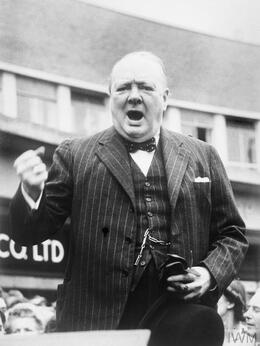 Darkest Hour highlights Winston Churchill’s extraordinary eloquence and showcases some of his most famous war time speeches. In his first address to the House of Commons as Prime Minister on 13 May, “I have nothing to offer but blood, toil, tears and sweat… you ask, what is our policy? I will say, it is to wage war! By sea, land and air! With all our might and with all the strength that God can give us; to wage war against the monstrous tyranny, never surpassed in the dark, lamentable catalogue of human crime… you ask, what is our aim? I can answer in one word: Victory, victory at all costs, victory in spite of all terror; victory however long and hard the road may be!” Marshalling the English Language for War As an observer noted, Winston Churchill marshalled the English language and sent it into war. Certainly his policy of war at all costs, meant an extremely long and hard ruinous road for the people of England, Europe and indeed the whole British Commonwealth. Was it Really Necessary? But the film Darkest Hour does raise the question: Was it necessary? Could Britain have chosen the road of peace and negotiation? That indeed is the whole premise of Patrick Buchanan’s book, Churchill, Hitler and the Unnecessary War – How Britain Lost its Empire and the West Lost the World. 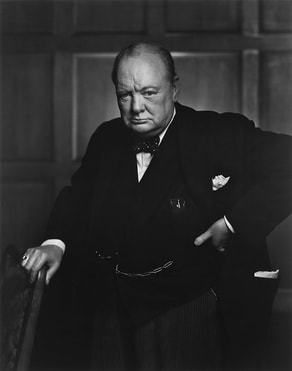 The Peace Option As Darkest Hour depicts, most of the Cabinet, including Neville Chamberlain and Lord Halifax, favoured a negotiated settlement and indeed Germany repeatedly offered most generous terms. That is certainly what President Herbert Hoover in his Freedom Betrayed book documents. These authorities are convinced that Britain could have continued to be the greatest political, economic and military superpower in the world through to the end of the 20th century and beyond, had Churchill not been hell-bent on a policy of war “at any price, in spite of all terror, however long and hard the road may be.” Peace Initiatives which were Spurned Peter Padfield makes the same point in his Hess, Hitler and Churchill: The Real Turning Point of the Second World War – A Secret History book. When Deputy Fuhrer Rudolph Hess set off for Britain on his peace mission in May 1941, it was the most dramatic of 16 major peace initiatives launched by Germany to end the war in the West. As made clear in multiple other offers through 1940-41, through neutral countries, such as Sweden and Switzerland, the German leadership was committed to evacuating all occupied European countries in the West in exchange for an ending of the British naval blockade and aerial bombardment of Germany. What Could One Lose by Accepting Those Peace Offers? What would Britain have to lose from accepting such an offer? Absolutely nothing. There was so much to gain and without any need for further loss of life. Crushing All Who Proposed Peace However, Winston Churchill had everyone connected with the peace initiatives in Great Britain, including generals, admirals, members of parliament and Lords, arrested and incarcerated, without charge and without trial, under emergency security legislation. Over 6,000 people were detained without trial under the Emergency Powers Act of 22 May 1940. 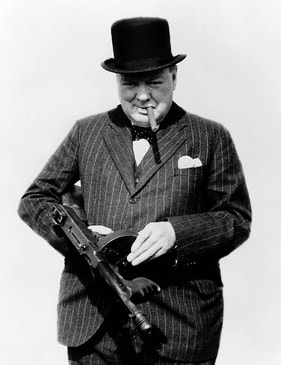 Crushing Dissent and Imprisoning Dissenters Under Winston Churchill, literally thousands of advocates for peace in Britain were imprisoned. All conscientious objectors on staff at the BBC were dismissed. Even members of parliament were detained for years, without charge or trial, under Churchill’s Emergency powers. Rudolf Hess Hess, who, as an unarmed peace emissary, should have been treated like an ambassador, was however, the last prisoner incarcerated in the Tower of London. Hess was completely muzzled, never allowed to speak to anyone concerning the war, or his peace initiative, for the rest of his life. Considering that he was the last surviving senior leader of the Third Reich, it is extraordinary that neither historians, nor journalists, were allowed any access to interview Hess, for decades, right up to his death under suspicious circumstances in 1987. Who Gains from This War? Peter Padfield makes clear in his book, Hess, Hitler and Churchill, the British people had everything to gain and nothing to lose from entering into such an agreement. Indeed many millions of lives would have been spared and much of the architectural and art treasures of Europe could have escaped arial destruction by bomber command. In fact, no soldiers needed to have died on the beaches of Normandy, or in the Battle for Arnhem, or indeed any of the battles from the Dieppe raid, onwards to the terror bombing campaigns that incinerated over 60 cities including Hamburg, Cologne, Dresden and Berlin. One person would have lost and that is Winston Churchill. He saw the war as his path to power and greatness. Ending the war early was against his personal ambitions. The only other “winner” or beneficiary of the disastrous World War was international communism, particularly Stalin’s Soviet Union. 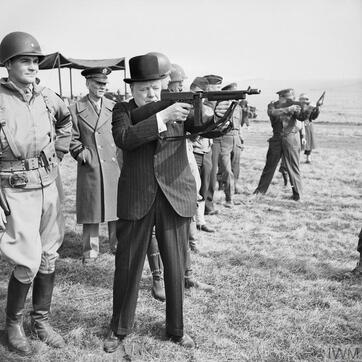 War Lord Even admirers and biographers of Winston Churchill acknowledge that he was more of a War Dictator than a Prime Minister. Never has any British prime minister consolidated more power and exercised it with greater influence than Winston Churchill did from 1940 to 1945. He even made himself Minister of Defence. As Minister of Defence he often bypassed the Chiefs of Staff and the War Cabinet secretariat by issuing personal instructions directly to squadron leaders and commanders in the field. Including ordering a series of “savage attacks” on the German capital, Berlin, in September 1941. When warned that such attacks would inevitably lead to counter bombing of London in reprisal, Churchill insisted the bombing go ahead. War State Churchill was in some ways, something of a Revolutionary. Formal hierarchies and normal procedures were no longer sacred in his administration. Anything that advanced the war effort was “good”. Anything that stood in its way was steamrolled or swept aside. Financial orthodoxy was thrown out the window. Britain went for broke. Limits on working hours in factories were ignored in the race for arms production. Total War While Germany never allowed mothers to be mobilised into the factories in the Second World War, Winston Churchill had no such compunctions and moved the country into a Total War-footing immediately, with 24 hours a day, 7 days a week, factory production and absolutely nothing was held back. However, Germany, by way of comparison, only moved on to such a Total War-footing as late as 1943, when it was actually too late. As Air Marshall Arthur Tedder of the Royal Air Force observed, Germany lost the war because she failed to wage Total War. 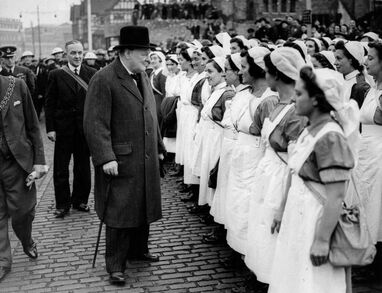 Women at War Mothers in Germany were excluded from factory work. Albert Speer, Reich Minister of Armaments and War Production, complained about the exclusion of millions of mothers from his work force, but was overruled by Adolf Hitler, who insisted that the primary duty of mothers was to be raising the children in the home. Churchill had no problem drafting women into war work by the Ministry of Labour and even using women in combat in anti-aircraft units and in the Special Operations Executive (SOE), which used many women in highly dangerous roles as secret agents, as Churchill put it, to “set Europe ablaze.” Dictatorial National Socialism in Britain After passage of the Emergency Powers Act of 22 May, Churchill had the legal power to do almost anything he liked with the citizens of Britain, or their property. As has been observed, Winston Churchill practised a national socialism in Great Britain in many cases more severe than that practised in war-time Germany. Total Control of the Media In those desperate days, Churchill dominated the radio and newspapers of Great Britain with calculated political acts and carefully prepared and rehearsed speeches designed to boost morale, denigrate defeatism and secure maximum work effort from farm labourers, factory workers and soldiers alike. History in the Making His speeches were also intended to resound through the ages as Churchill noted that he never forgot that he was an actor on the great stage of history. He commented that history would be kind to him because he intended to write it! 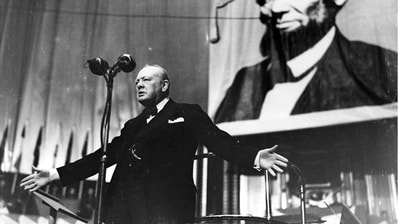 Surprising Success of Churchill’s Oratory Professional broadcasters expressed their surprise at the success of Churchill’s speeches. Churchill’s style of oratory was at least 20 years out of date and considered most unsuitable for the intimacy of radio. They noted that he addressed not the real British people with their skepticism and materialism, but he addressed a heroic people of his own imagination, the living embodiment of great historic tradition. Churchill drew on the broad sweep of English history, recalling the Battles of Agincourt and Trafalgar, which actually meant little or nothing to most of his listeners. Yet he succeeded in evoking a pride in imperial glory and national destiny that for most British people had died long before, if it had even existed at all! Yet, Churchill’s speeches worked, despite their archaic language, the occasional colloquialism amidst high flowing phrases and flashes of cheeky humour delivered with a strangely compelling voice. Churchill’s speeches were resonant with high emotion, quite unusual for the British people at that time. Effective Dramatic Simplicity Churchill demonstrated an effective dramatic simplicity in his brilliant speeches, such as after the desperate evacuation of the British Expedition Force from the beaches of Dunkirk: “We shall fight in France, we shall fight on the seas and oceans, we shall fight with growing confidence and strength in the air, we shall defend our island, whatever the cost may be, we shall fight on the beaches, we shall fight on the landing grounds, we shall fight in the fields and in the streets, we shall fight in the hills; we shall never surrender!” Was it Even Necessary to Wage War at All? Churchill’s impressive speech making abilities may have clouded a more pertinent question: Was it even necessary to fight this war at all? 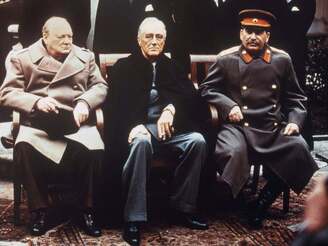 Facts that Undermine the Fiction Germany had never declared war on Britain. Germany never wanted to fight Britain. Germany was offering the most generous peace terms imaginable for a victorious army. Why could Britain not just go her way and end the naval blockade and arial bombardment of Germany? What was to be gained? Indeed what was gained? Their Finest Hour After the dramatic and complete military defeat of France within a mere six weeks, Churchill demonstrated again his inspired journalist knack of coining an unforgettable phrase: “The battle of France is over. I expect that the battle of Britain is about to begin… let us therefore brace ourselves to our duty and so bear ourselves that, if the British Empire and its Commonwealth last for a thousand years, men will still say, this was their finest hour!” Was WW2 Really Britain’s Finest Hour? Great words, inspiring. However, was it even true? In what way can one claim that one’s own times are the finest hour for an empire over many centuries? Many historians may say that Britain’s 19th century naval campaign against the slave trade, clearing the oceans of slave ships and setting countless captives free, was their finest hour. Indeed there are many more worthy contenders for the title: “Their finest hour”. Memorable Exaggeration and Presumption After the Battle of Britain there was the famous tribute to the gallant pilots of Fighter Command: “Never in the field of human conflict was so much owed by so many, to so few.” Memorable, inspiring and unforgettable. However, again, surely gross presumption and exaggeration. 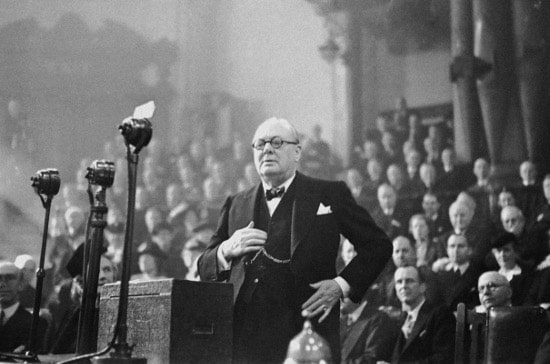 Thermopylae and the 300 Spartans Would not those words have been more appropriately attributed to King Leonidas and his 300 Spartans? The Battle of Thermopylae 480BC, where an initial Greek force of 7,000 blocked the path of the Persian Army claimed to number over a million for 7 days. When their position was outflanked, King Leonidas dismissed the bulk of the Greek Army and remained to safeguard their retreat with 300 Spartans, 700 Thespians and 400 Thebans, who all fought to the last man. This bold and sacrificial delaying action enabled the Greek Navy to withdraw to Salamis, where they later won a great victory against the Persian Navy and effectively saved Europe from Asiatic control. Malta, Lepanto and Vienna Similarly one could recount the courageous siege of Malta where a few hundred knights of St. John held out against a vast Turkish Army in a siege of almost 4 months, helping to save Western Europe from invasion. The decisive naval battle of Lepanto in 1571 and the successful raising of the siege of Vienna of 1683, are surely far more worthy recipients of such an accolade: “Never in the field of human conflict was so much owed by so many, to so few.” War Propaganda However, Churchill’s speeches were backed up by impressive press photos, rousing news reels and strategic personal appearances - all designed to promote war-propaganda and further mobilise the nation and the empire in a war at all costs, to the very end. 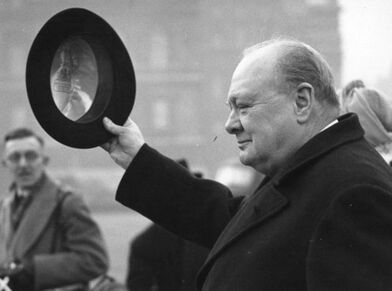 Self-Indulgent Decadence It was extraordinary that Winston Churchill came to be so popular with the common people as he was probably the most ostentatiously self-indulgent leader who has ever been appointed to 10 Downing Street. He woke at around 8am to be served a copious breakfast with despatch boxes of telegrams and memorandums. He stayed in bed for most of the morning, dictating to his secretaries. His first bath of the day followed (he generally had two baths each day and changed his shirt three times a day). Each of the three meals a day were by all estimations, massive and included brandy and cigars. Churchill frequently embarrassed officials by appearing like a Roman Emperor in his bath towel, dripping from the bathroom, at all hours of the day. Daily, his secretaries had to take dictation from him while he luxuriated in the bath. Believing His Own Propaganda Churchill continually sought to convince himself and those around him of the success of his strategies and of the truth of his own speeches. However, the generals and admirals around him were well aware that, contrary to his broadcasts and speeches, Britain was not winning, the German people were not demoralised, nor was the German economy anywhere near a breaking point, it was not even on a full war footing yet! 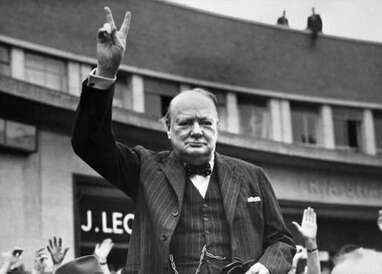 No Survival without Victory? Darkest Hour showcases some of the great speeches of Winston Churchill, including: “Without victory there can be no survival!” which makes rousing patriotic speech, but is it true? There are many countries that have experienced defeat in war that have survived, even thrived. As Rev. Bill Bathman pointed out in his book, Going Through, when he first arrived as a missionary in Europe in 1951, Britain was economically depressed and looked like they had lost the war, whereas Germany, despite having been savagely bombed by almost non-stop thousand bomber raids, which turned their cities into rubble, Germany in the 1950s looked like they had been the victors of the Second World War. The phenomenal work ethic of the Germans rebuilt their country faster and better than Britain. France was defeated by Germany in 1871 and 1940 and survived much better than they did with their apparent victory in the First World War. French deaths from the First World War exceeded 1.3 million. French deaths in the Second World War were under 100,000, at least from the German Army. More than that were killed by Allied bombardments in the Liberation. Even Poland which suffered more than most countries in the Second World War and was decisively defeated both by the Germans and the Russians, survives and in fact thrives as one of the freest nations in Europe today. As my own father, who fought all six years of the Second World War in the Royal Artillery declared: “If we could have seen what would happen to Britain after the war, we would not have fought against one another, but together against the real enemy!” Was it Worth the Cost? As Darkest Hour so dramatically demonstrates, Winston Churchill used rhetoric to harden public opinion against a peaceful resolution. He really did marshal the English language and send it off to war! But was it worth it? 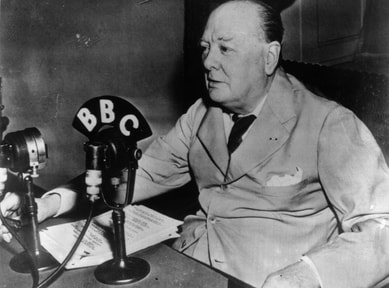 Why Was Negotiation so Unthinkable? One of the most intense scenes in Darkest Hour is where Winston Churchill bellows at his War Cabinet: “You cannot reason with a tiger when your head is in its mouth!” Again, a great turn of phrase, but in what sense was it true? The vast British Empire was by no means in a tiger’s mouth. As the English Channel had stopped Napoleon’s forces 150 years before, so it would prove an insurmountable obstacle to Hitler’s panzers. As Patrick Buchanan points out in his Churchill, Hitler and the Unnecessary War book, Germany never had an aircraft carrier, nor produced landing craft or four-engine bombers. It was evident by the very weapons of the Wehrmacht, Kriegsmarine and Luftwaffe that world domination was never their aim, only domination on the European continent. World Domination World domination is what Britain, France, the United States and Japan had with their massive empires, predominance of aircraft carriers and huge naval fleets. If Germany wanted world domination, then it would have helped them to demand the surrender of France’s Naval Fleet. France’s Navy was more than 4-times the size of Germany’s Kriegsmarine. However, despite the Allies having demanded the German High Seas Fleet and Merchant Marine at the end of the First World War, Germany never demanded France’s Fleet, even after their decisive six-week Blitzkrieg victory over France. We Cannot Compromise with Dictators Winston Churchill famously declared time and again that it was impossible to compromise with dictators! A fine sentiment, except that he has once been a great admirer of II Duce, Mussolini, the dictator of Italy. Churchill praised Mussolini on 20 January 1927: “I could not help being charmed by Senior Mussolini’s gentle and simple bearing and by his calm, detached poise, in spite of so many burdens and dangers.” Supporting Mussolini’s Fascism in Italy On Mussolini, Churchill extolled “If I were Italian, I am sure I would have been with you entirely from the beginning!” “What a man! I have lost my heart! Fascism has rendered a service to the entire world!” 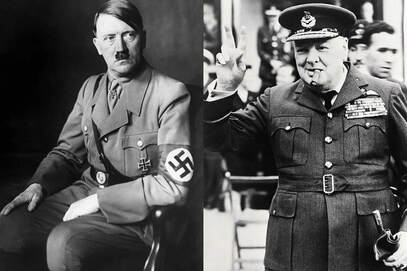 Praise for Hitler As late as 7 November 1938, Winston Churchill was quoted in the London Times stating: “I have always said that if Great Britain were defeated in war, I hope we should find a Hitler to lead us back to our rightful position among the nations… those who have met Herr Hitler have found a highly competent, cool, well-informed functionary, with an agreeable manner, a disarming smile and few have been unaffected by a subtle personal magnetism.” Steadfast Support for Stalin Interesting as those quotes may be, the massive fact of history is that Winston Churchill compromised with the most bloodthirsty dictator in the history of mankind, Joseph Stalin of the Soviet Union. As Pat Buchanan observed: “Churchill knew of the mass-murders on Lenin’s orders, the massacre of the Czars’ family, Stalin’s slave labour camps, the forced starvation in Ukraine, the Great Purge of the old comrades and Russian officer corp, the Show Trials, the rape of Finland and the Baltic Republics and Katyn.” As historian John Lewis Gaddis writes, “The number of deaths resulting from Stalin’s policies before World War Two was between 17 and 22 million. A thousand times the number of deaths attributed to Hitler as of 1939, the year Churchill was clamouring for war on Hitler and an Alliance with Stalin!” Double Standards In 1919 Churchill had no doubt that “of all the tyrannies in history, the Bolshevik tyranny is the worst, the most destructive, the most degrading. The atrocities committed under Lenin and Trotsky were incomparably more hideous, on a larger scale and more numerous than any for which the Kaiser is responsible.” Yet, Churchill could condemn Chamberlain for being naïve about Hitler and yet 25 years after Lenin’s Revolution and the Red Terror, he declared that the more he met Stalin, the more he grew “to like that man.” “This truly great man, the father of his nation!” 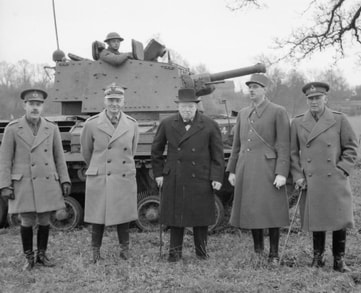 The Assassination of General Sikorski Far from refusing to compromise with dictators, in order to placate Stalin, Churchill ordered the assassination of General Wladyslaw Sikorski, Polish Commander-in-Chief and prime minister of the Polish government-in-exile, 4 July 1943, in a highly suspicious aircraft accident off Gibraltar. General Sikorski was demanding an International Red Cross investigation of the Katyn Forest Massacre. Churchill privately admitted that he realised it was the Soviet Union who had massacred the entire Polish Officer Corp at Katyn, but Sikorski’s demand was placing a strain on the alliance between the United States, the United Kingdom and the Soviet Union. Sikorski had to go. The fact that Stalin ordered a breaking off of diplomatic relations with the Polish government in exile over this request, was as good as an admission of Soviet guilt. The official version states that General Sikorski and his entire leadership staff, including his daughter, Zofia, perished when their RAF Liberator crashed into the sea, only sixteen seconds after take-off from Gibraltar airport, 23:07 on 4 July 1943.The only survivor of the crash was the pilot. Many of the bodies were never recovered. The notorious British agent Kim Philby, head of Counter Intelligence for Mi6 in Gibraltar at the time, was later found to also be a Soviet KGB Colonel. The Polish government refused to endorse the official report of the British court of enquiry. The Betrayal of Eastern Europe Christians in Eastern Europe have pointed out to me the hypocrisy of the allied position and the duplicity of Churchill in particular. “What freedom? We never received any freedom? You (the allies) betrayed us into the hands of Stalin’s Soviet Union.” 15 nations, 100 million Christians, betrayed behind the Iron Curtain by the Yalta Agreement. 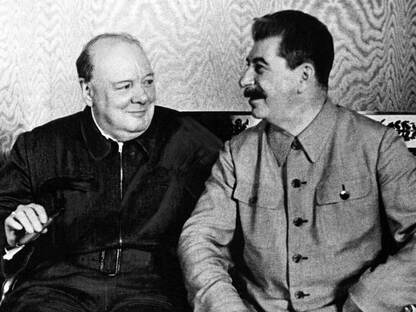 Saving the Soviet Union Churchill’s unwavering support for Soviet dictator Joseph Stalin was also seen in the extraordinary sacrifices made through the so-called Lend-Lease. Over $11 Billion (equivalent to over $160 Billion today) of weapons and strategic equipment was shipped to the Soviet Union during the Second World War. Of this $6.8 Billion came from the British and Commonwealth countries. Great Britain alone, between June 1941 and May 1945, delivered to the USSR over 3,000 Hurricanes (fighter planes), 4,000 other aircraft, including 1,000 Spitfires, 27 naval vessels, over 5,218 tanks, over 5,000 anti-tank guns, 4,000 trucks and ambulances, 323 machinery trucks, 1,212 universal carriers, 1,721 motorcycles, £1.15 Billion of aircraft engines, 1,474 radar sets, 4,338 radio sets, 600 naval radar and sonar sets, hundreds of naval artillery pieces, 15 million pairs of boots, over 4 million tonnes of raw material, with ammunitions totalling over £308 Million, £120 million of food materials. All military aid sent from Britain to the Soviet Union during the war was entirely free of charge! Well, not free from our perspective. The Soviet Union never paid a Ruble for any of this generosity from Britain, which was greatly exceeded by the United States’ generosity. Gold from South Africa Funded Lend-Lease However, Churchill instructed his friend, General Jan Smuts of South Africa, who had managed to consolidate the offices of prime minister, minister of defence and minister of foreign affairs in himself. Smuts had replaced the popularly elected Prime Minister General James Barry Hertzog when he refused to declare war on Germany. By Churchill’s request, Smuts arranged for all South African gold available above ground to be shipped, in great secrecy, via Simonstown, loaded at night onto the USS Quincy, an American battlecruiser, sent by FDR for the express purpose of transporting South African gold to New York, to pay for America’s extravagant generous Lend-Lease to the Soviet Union. No wonder Winston Churchill said: “the truth needs a bodyguard of lies to protect it!” Unprincipled Winston Churchill was the source of great speeches, but not good policies. Nor were his speeches true to reality. They did not even express his own personal principles. As many members of parliament around him declared: “Winston is entirely devoid of any principles at all. The only thing he cares about is himself!” 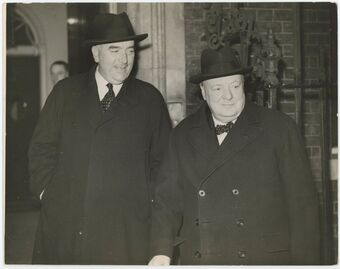 Slave of Rhetoric Robert Menzies, the prime minister of Australia, said of Winston Churchill, “His real tyrant is the glittering phrase so attractive to his mind that awkward facts have to give way!” Another observed: “He is the slave of the words which his mind forms about ideas… and he can convince himself of almost every truth, if it is once allowed thus to start on its wild career through his rhetorical machinery!” The Real Enemy was Communism Rhodesian Prime Minister, Ian Smith, who served all 6 years of the Second World War as a fighter pilot in the Royal Rhodesian Air Force and who was shot down behind enemy lines, declared that upon reflection, we would have been better off losing World War Two or even better, not getting involved in it at all. “We lost more by winning than we would have lost by losing!” “With hindsight, we fought on the wrong side. The real enemy was communism. We did not realise it at the time, of course, but we were not really fighting for Christian civilisation and freedom, because we were allied to Stalin’s Russia. Instead of freeing Europe, we helped Stalin enslave half of it under communism.” Ian Smith told me: “It would have been better if Britain had stayed out of the war and let Germany smash communism in Russia once and for all. Or better still, we should have actually helped free Russia from the communists. That would have spared a lot of people much grief.” Supporting Tito’s Communists in Yugoslavia Joseph Stalin was not the only dictator supported by Winston Churchill. Through his SOE he channelled vast amounts of military support to Josip Broz Tito, the communist revolutionary, enabling him to seize control of Yugoslavia and turn it into a brutal communist state. This is incredible because the British deliberately betrayed the Royalist forces of Draža Mihailović in favour of Tito’s communists. 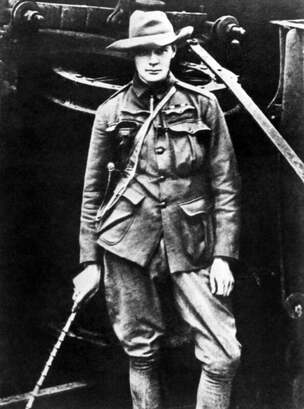 Non Principled Darkest Hour suggests that Winston Churchill was a principled person, concerned with doing the right thing. However, his track record would suggest otherwise. His political record is of an opportunist who crossed the floor and leapfrogged to other parties, an incredible four times. Depending on how the political winds were blowing, he moved from conservative to liberal, to constitutionalist and then back to conservative, changing party loyalty in order to gain high political office. As John Marley declared in 1908: “Winston has no principles.” in 1913, A.G. Gardiner declared: “Winston will write his name in history… in blood.” “The Greatest Briton of All Time!” A BBC poll in 2002 declared that people in Britain consider Winston Churchill the “greatest Briton of all time!” He is certainly one of the most extraordinary people of the 20th century, having come under fire as a correspondent attached to the Spanish Army in Cuba during the war there, fought with the Malakand Field Force in India and Afghanistan, rode in the last cavalry charge of the empire at Omdurman, was taken prisoner in the Anglo Boer War, escaped to write best-selling books about his war experiences, became an international celebrity and entered parliament at 26-years old. At 36 he was the First Lord of the Admiralty, where he was the most powerful voice in the British Cabinet for war. Cashiered after the Dardanelles/Gallipoli disaster, Churchill spent some time at the Yper Front and then became Minister for War and Air in Lloyd George’s cabinet. He was at the centre of power for most of the first half of the 20th century and participated in all of the great decisions of Britain which affected its decline in the 20th century. Possibly the most famous of all British prime ministers, his speeches and quotes have been some of the most admired and repeated in history. However, not since fictional personages, like Zeus and Hercules, have so many myths been attached to one man. Most people today know more about the myth of Churchill than the facts behind the fantasy. Plagiarism Some have pointed out that Winston Churchill was not quite as original as sometimes thought with his famous speeches. His famous “We shall fight on the beaches…” speech borrows liberally from Irish Republican leader Robert Emmet. His Finest Hour speech borrowed heavily from the French premiere Clemenceau. 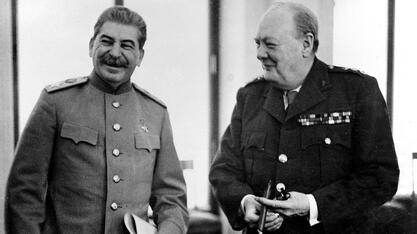 New Lies for Old Churchill’s speeches praising Stalin, so please the Soviet leader that Molotov ordered Churchill’s speech published in Pravda! Persecuted Christian in Eastern Europe told us that Pravda, which means truth and Izvestia, which means news, were described by them as “there is nothing true in Pravda and nothing new in Izvestia!” Treacherous Collaborator Christian friends in Eastern Europe have observed to me that in their estimation Winston Churchill was a collaborator with the communists in the betrayal of their people for whom Britain claimed they had gone into war! The Churchill Catastrophe The true legacy of Winston Churchill is the collapse of the British Empire and the betrayal of Eastern Europe into the hands of the Soviet Union. From his entry into the inner cabinet as First Lord of the Admiralty in 1911, to his final departure from 10 Downing Street in 1955, that half century encompasses the collapse of British power worldwide. The title of Churchill’s last book of his six volume history of World War 2, Triumph and Tragedy, was appropriate. His deeds brought triumph to himself, but produced tragedy for his nation and the world. He had inherited a great empire but left an island nation off the coast of Europe with three centuries of its wealth, power, possessions and prestige, sunk, or sent to America. Dr. Peter Hammond Reformation Society P.O. Box 74 Newlands 7725 Cape Town South Africa Tel: 021-689-4480 mission@frontline.org.za www.ReformationSA.org See also: Darkest Hour – The Legend of Winston Churchill Was Churchill Really the Greatest Briton of All Time? Was Franklin Delano Roosevelt Really a Reluctant Participant in the War? Dunkirk – Separating Fact from Fiction How Capitalists Saved Communism from Collapse The Bombing of Cities in WWII The Katyn Forest Massacre Freedom Betrayed How Propaganda Changes Perceptions and People How the New World Order is Hijacking Civilisation
0 Comments
Leave a Reply. |
Categories
All
Archives
October 2022
|
 RSS Feed
RSS Feed